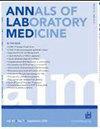Guide to Rho(D) Immune Globulin in Women With Molecularly Defined Asian-type DEL (c.1227G>A).
IF 4
2区 医学
Q1 MEDICAL LABORATORY TECHNOLOGY
引用次数: 0
Abstract
Rh hemolytic disease of the fetus and newborn is a potential risk for D-negative mothers who produce anti-D during pregnancy, which can lead to morbidity and mortality in subsequent pregnancies. To prevent this hemolytic disease, Rho(D) immune globulin (RhIG) is generally administered to D-negative mothers without anti-D at 28 weeks of gestation and shortly after delivery. However, current guidelines suggest that pregnant mothers with molecularly defined weak D types 1, 2, 3, 4.0, and 4.1 do not need RhIG as they are unlikely to produce alloanti-D when exposed to fetuses with D-positive red cells. This issue and the necessity of RHD genotyping have been extensively discussed in Western countries, where these variants are relatively common. Recent evidence indicates that women with Asian-type DEL (c.1227G>A) also do not form alloanti-D when exposed to D-positive red cells. We report that mothers with molecularly defined Asian-type DEL, similar to those with weak D types 1, 2, 3, 4.0, and 4.1, do not require RhIG before and after delivery. Collectively, this review could pave the way for the revision of international guidelines to include the selective use of RhIG based on specific genotypes, particularly in women with the Asian-type DEL.分子定义的亚洲型 DEL(c.1227G>A)妇女的 Rho(D)免疫球蛋白指南。
胎儿和新生儿的 Rh 溶血病对孕期产生抗-D 的 D 阴性母亲来说是一种潜在的风险,可能会导致后续妊娠的发病率和死亡率。为了预防这种溶血病,一般会在妊娠 28 周和分娩后不久为没有抗-D 的 D 阴性母亲注射 Rho(D)免疫球蛋白(RhIG)。然而,目前的指南建议,分子定义为弱 D 1、2、3、4.0 和 4.1 型的孕妈咪不需要注射 RhIG,因为当她们接触到 D 阳性红细胞的胎儿时,不太可能产生同种抗-D。在这些变异相对常见的西方国家,这个问题和 RHD 基因分型的必要性已被广泛讨论。最近的证据表明,患有亚洲型 DEL(c.1227G>A)的妇女在接触 D 阳性红细胞时也不会形成异抗原-D。我们报告说,分子定义的亚洲型 DEL 母亲与弱 D 型 1、2、3、4.0 和 4.1 母亲类似,在分娩前后不需要 RhIG。总之,本综述可为修订国际指南铺平道路,使其包括根据特定基因型选择性使用 RhIG,尤其是亚洲型 DEL 的产妇。
本文章由计算机程序翻译,如有差异,请以英文原文为准。
求助全文
约1分钟内获得全文
求助全文
来源期刊

Annals of Laboratory Medicine
MEDICAL LABORATORY TECHNOLOGY-
CiteScore
8.30
自引率
12.20%
发文量
100
审稿时长
6-12 weeks
期刊介绍:
Annals of Laboratory Medicine is the official journal of Korean Society for Laboratory Medicine. The journal title has been recently changed from the Korean Journal of Laboratory Medicine (ISSN, 1598-6535) from the January issue of 2012. The JCR 2017 Impact factor of Ann Lab Med was 1.916.
 求助内容:
求助内容: 应助结果提醒方式:
应助结果提醒方式:


